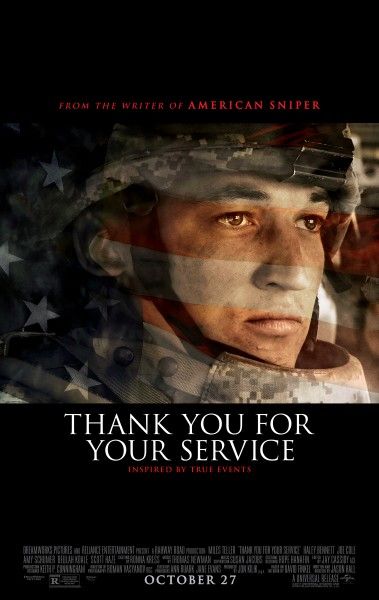In two years, we’re going to start sending off soldiers to fight in a war that began before they were born. The troops are sacrosanct in America, but when it comes to tangible ways to help them when they return from combat, Americans prefer to look the other way. Jason Hall’s Thank You For Your Service attempts to be a direct plea to viewers to help veterans by showing the struggles they face when returning to civilian life, but rarely does it comes across a point we haven’t seen before. Instead of trying to look at the bigger picture of how this situation happens, Hall tries to focus on three stories, and comes to a conclusion that’s become part of the tapestry of American life rather than shocking us out of complacency.
Soldiers Schumann (Miles Teller), Solo (Beulah Koale), and Waller (Joe Cole) come home after serving in Iraq in 2007 and while they put on a brave face, they quickly discover they can’t easily return to civilian life. Schumann is listless and traumatized by survivor’s guilt, Solo is wrestling with brain trauma that’s causing memory loss and bouts of rage, and Waller has come home to a life that no longer exists. When they seek treatment at the VA, they discover a bureaucracy that can’t help them and even charitable organizations have long waiting lists. Their lives become ticking clocks where they actively want help, but the trauma they’ve endured may consume them before they can get the help they need.
I have no doubt that Hall, who makes his directing debut on Thank You for Your Service, has a deep and abiding respect for the troops. To his credit, he does a great job of putting you inside their heads when it comes to how they perceive the world—as a non-stop barrage of threats. Everything they do—from riding in a car to playing video games to going to a food court—risks an episode, and the film keeps its tension because we want to see these men survive, but we also know that our country has fallen drastically short of ways of help them.
Despite excellent performances from the cast, especially Koale, who is absolutely heartbreaking in his role, Thank You For Your Service functions more like a PSA. Movies that came relatively early in the war like In the Valley of Elah and Stop-Loss also sounded the alarm about PTSD and our shoddy treatment of veterans, but Americans really don’t want to pay attention. Even a film like American Sniper, which Hall wrote and was the top-grossing movie of 2014, functions more like propaganda rather than an alert on PTSD, which only comes in at the very end of the film. Films dealing with soldiers have shown that American are happy to consumer war stories as entertainment, but they don’t use these movies as a call to action.
The problem with movies that try to focus on the individual soldiers is that even though the story’s heart is in the right place, they’re missing the larger scope of the issue. In order to get a movie that really sticks with people and has them thinking about this issue longer than the few minutes it takes to get from the auditorium to the exit, we need a story that tackles all angles, like Traffic but for veterans. Thank You For Your Service will occasionally graze up against the scope of the issue like overworked VA employees or commanding officers who think that seeking help is bad for morale, but those moments quickly dissipate and we return to the suffering veterans.
Hall’s direction is good enough when it comes to his lead characters, but he lacks the skill and experience to make Thank You For Your Service more than an agreeable homily. The title is meant to be bitterly ironic—what we say to veterans rather than what we do for them—but Hall’s movie doesn’t offer much more. By trying to stay so close to the protagonists and doing so in such a straightforward manner, the picture doesn’t come alive. It would be nice if we didn’t have to shock viewers out of their complacency to do the decent thing, but after 16 years of war, that’s where we are. And Thank You For Your Service, rather than looking at how we got here and how we can move forward, is little more than the bumper sticker is seeks to critique.
Rating: C




